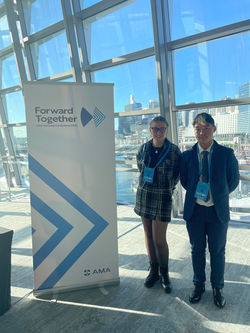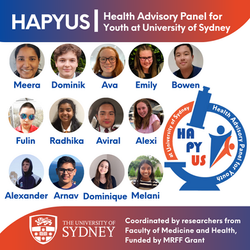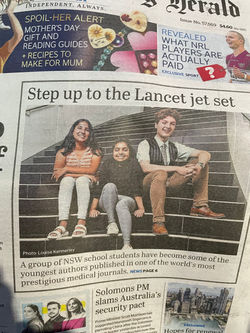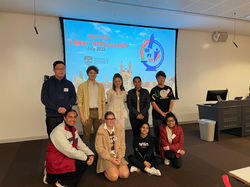Health Advisory Panel for Youth at The University of Sydney

We call it HAPYUS! (pronounced ‘Happy Us’) - a name chosen by our very first group of youth advisors back in 2021.
About HAPYUS
HAPYUS plays a central role in shaping our research. This initiative brings together a group of 16 passionate adolescents aged 14–18 from all across NSW to partner with our team, helping us design and deliver research that truly reflects what matters to young people.
Since 2019, we’ve run two successful cohorts (2021–2022 and 2024) and supported 32 young people.
We plan to recruit a third group for 2025–2026 - stay tuned!
HAPYUS supports all three of our research streams — digital health innovation, food environments, and youth engagement — by contributing ideas, co-creating research, advocating for youth voices in policy, and building their own skills in leadership, communication, and health research.
By participating in HAPYUS, young people gain real-world experience and create impact in adolescent health research and policy. Their insights have already influenced national conversations, including media features, peer-reviewed publications, and high-level forums.
Our 12-month Program
Youth advisors meet monthly via Zoom and attend one on-campus workshop day - often a highlight - where they connect in person, build relationships, and experience what it is like to be a researcher at the university.
Across the year, participants contribute to real research projects across all three of our research streams, co-design youth health projects, and develop skills in communication, leadership, and research methods.
Youth advisors will also meet academic researchers, share lived experiences and the reality of being a young person, and help shape project directions and outputs.
HAPYUS is a model for meaningful youth engagement, with members recently co-authoring academic publications and driving digital health innovations for their peers.

Evaluating Our Impact
We led a comprehensive evaluation of our first 2021–2022 HAPYUS cohort to understand how youth advisory groups benefit both young people and research. This evaluation included surveys and interviews conducted over 12 months, and the findings have been published in several peer-reviewed journals and youth-led commentaries. We found that meaningful youth engagement creates impact for young people and for science.
For young people:
-
Develop leadership, communication, and teamwork skills
-
Build confidence in sharing ideas and shaping decisions
-
Gain real-world experience in health research and advocacy
-
Contribute to scientific publications, events, and media
-
Learn about health topics that matter to them
-
Explore career pathways in science, health, and research
-
Feel heard, included, and empowered to make a difference
For researchers:
-
Design more relevant, engaging research and interventions
-
Improve recruitment and retention of young participants
-
Strengthen research impact through lived experience insights
-
Identify emerging health priorities directly from youth
-
Foster innovation through youth-led ideas and feedback
-
Disrupt traditional research models in positive, inclusive ways
-
Ensure research is meaningful and co-created, not top-down
We also build in feedback after every HAPYUS cohort to continuously improve the experience for young people and strengthen the way we collaborate.
The idea of being
involved in the scientific community, when we've always been told it would need experience and qualifications, was simply wild! Hopefully, our work has inspired many young people to believe in our power to make a change
- Bowen, 2021/22
We are so impressed with how you have nailed consumer engagement, so much so that we have cited your study as a good practice benchmark during recent workshops
- Participant feedback from webinar
Evaluation Published in Peer-Reviewed Journals
Our evaluation includes a published perspective co-authored by only youth advisors - see Mautner et al 2024
Our 2024 Cohort
Adarsh, Caitlyn, Chloe, Elena, Giovanna, Lucy A, Lucy G, Lucy G, Moudasir, Natalie, Nitika, Raheela, Shuwei, Sweta, Tanvi, Yi Ying


Our 2024 cohort continues to build on the strong foundation laid by our first group. These dedicated young people have played an active role across all three of our research streams, bringing fresh insights and energy to every project.
A major highlight has been their authorship of a perspective piece titled “Shifting focus to adolescent wellbeing and inclusive participation in the digital age”, which has been published in the Medical Journal of Australia - this makes them among the youngest authors in the journal’s history, a testament to their commitment and capability.
The 2024 cohort has also contributed significantly to our Health Hive Project, a key initiative within our Youth Engagement stream. Their input has shaped the project’s direction, content, and focus on meaningful adolescent participation. Several additional research outputs and co-authored publications are currently under review, with more to come.

Our First 2021-2022 Cohort

The first cohort met monthly via Zoom throughout 2021–2022. These 16 passionate adolescents worked alongside our research team to identify and discuss the top health issues affecting young people, particularly in relation to chronic disease prevention.
What began as a simple writing task, summarising their concerns in 300 words, turned into a 2,000-word essay that was published in The Lancet Child & Adolescent Health (Valanju et al., 2022). Their work attracted national media attention, including a front-page feature in the Sydney Morning Herald and a segment on Channel 7 Sunrise.
Beyond publishing, this cohort became advocates for youth health. They were invited speakers at the Australian Medical Association conference, where they spoke alongside Australia’s Chief Medical Officer, Professor Paul Kelly, and participated in Sports Australia’s national panel on keeping girls in sport. Members also presented at international conferences and co-authored additional peer-reviewed research supporting all three of our research streams: digital health innovation, food environments, and youth engagement.
Key publications include:

Alexi, Alexander, Arnav, Ava, Bowen, Dominique, Dominik, Emily, Fulin, Imeelya, Meera, Melani, Radhika

Resources For Researchers
Download 'A Guide to Setting Up a Youth Advisory Group'
Suggested citation:
Raeside R, Tsang TL*, Wong SH*, Todd A, Partridge SR (*Equal contribution). A guide to setting up a youth advisory group. V1.1. 2025. Access online: www.YouthWellLab.com
Last updated 5 August 2025.
Coming soon!
Download 'Recommendations for co-authoring with adolescents'
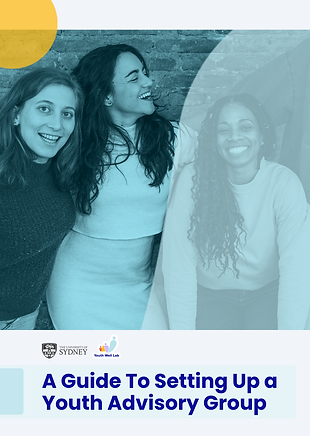
The Health Hive
Collectively, our research on youth engagement, including the work of HAPYUS, contributed to a successful application for a Medical Research Future Fund (MRFF) Consumer-Led Grant (#2023165). This funding is now supporting the development of The Health Hive: a national infrastructure project to help young people across Australia take an active role in health research.
While HAPYUS remains a core and valued part of our immediate research team, The Health Hive is expanding our reach, providing more young people with the opportunity to get involved in shaping research that affects their lives.
The Health Hive is designed to empower young people to engage in research in ways that work for them. Whether it’s sharing ideas, giving feedback, or leading their own projects, the Hive offers tools, resources, and confidence to support involvement at every level. It’s a starting point - and a home - for young people who want to help build a healthier future through research.






